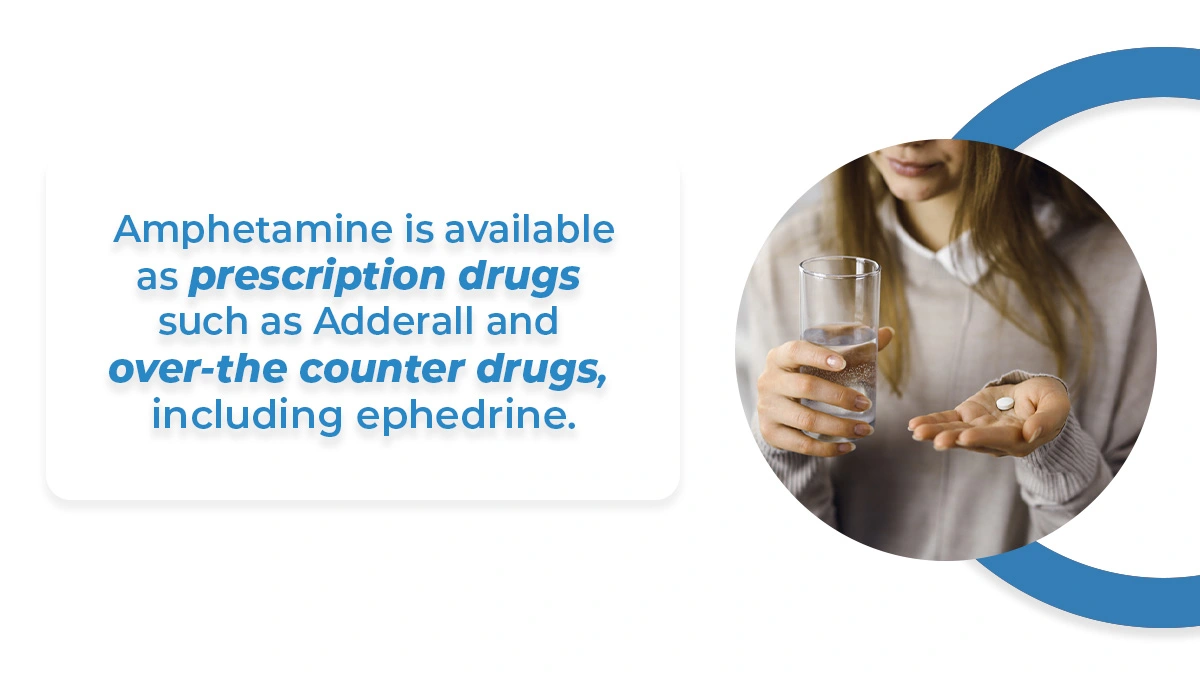Inside the Pill: Drugs With Amphetamine
Amphetamines are a class of stimulant drugs that include medications like Adderall and Dexedrine. They enhance alertness and focus by increasing dopamine levels in the brain.
In prescription form, it is used to treat conditions like ADHD and narcolepsy. Amphetamines can improve concentration and curb impulsivity. However, they carry a risk of abuse due to their potential for euphoria.
Illicit forms, like methamphetamine, have strong stimulant effects and pose serious health risks requiring amphetamine addiction treatment. For safe use, it is vital to know about the forms of drugs available and its effect on your body and mind.
Key Takeaways
Amphetamines, like Adderall and Vyvanse, boost alertness by increasing dopamine in the brain. Here’s what you need to know about this drug:
- In the 1920s, amphetamines emerged, gaining popularity for alertness and later used during World War II.
- Amphetamine is available as prescription drugs such as Adderall and over-the-counter drugs, including ephedrine.
- Recreational use and long-term misuse may lead to addiction and dependence, highlighting the need for awareness of drug and addiction treatment.
The Recovery Team stands with you during tough times and offers holistic approaches to recovery. Contact us today at (800) 817-1247.
Background of Amphetamine
The appearance of amphetamines in the 1920s gained popularity for boosting alertness. This drug was used in World War II to combat fatigue, and its therapeutic applications expanded postwar. In the 1960s, they emerged as weight-loss aids.
However, escalating misuse prompted tighter controls. Prescription amphetamines like Adderall emerged for ADHD in the 1990s. Their stimulating effects on heart rate and blood pressure pose risks, including irregular heartbeats.
Overuse can lead to dependence, with withdrawal symptoms like fatigue and depression upon discontinuation. Illicit methamphetamine abuse surged, contributing to a global health concern.
Medical Uses
Amphetamines serve various therapeutic purposes, primarily in treating conditions related to the central nervous system. Here are its uses:
ADHD Treatment
Amphetamines, particularly in the United States, are widely prescribed for attention deficit hyperactivity disorder (ADHD) in both children and adults. Doctors carefully manage their use for the treatment of ADHD to enhance focus and curb impulsivity. However, caution is crucial due to the drugs’ stimulant nature, potential adverse effects, and high possibility for misuse.
Narcolepsy Treatment
In the medical world, amphetamines find application in treating narcolepsy, a sleep disorder causing sudden episodes of daytime sleepiness. Prescribed by doctors, these stimulants help regulate wakefulness, allowing people with narcolepsy to lead more normal lives.
Other Therapeutic Uses
Beyond ADHD and narcolepsy, amphetamines have been explored for other therapeutic uses. While caution prevails due to their potential for misuse and negative effects, ongoing research examines their role in conditions like depression and obesity. Doctors play a crucial role in balancing the benefits and risks, ensuring responsible and informed use of these medicines.
Recreational Purposes and Risks
Amphetamines, sometimes abused as recreational drugs, exert stimulating effects on the human body. Common street names include “speed” or “uppers.”
Immediate-release tablets amplify the risk as individuals seek an intense, immediate high. The use of stimulants poses severe risks, including high blood pressure, addiction, and mental illness.
Mixing amphetamines with other drugs increases the potential for dangerous interactions, heightening the risk of serotonin syndrome and substance use disorders. Prolonged misuse may impact physical and mental health.
Common Amphetamine Prescription Drugs
Amphetamine prescription drugs are often utilized to address various central nervous system (CNS) conditions. These medications can provide therapeutic benefits when used responsibly and under medical guidance.
Adderall
Adderall is a prominent amphetamine prescription drug containing a mix of l-amphetamine and d-amphetamine. Typically prescribed to manage specific health conditions, it must be taken strictly according to a doctor’s prescription to ensure safe and effective use. Also, ask healthcare providers about drug interactions since mixing Adderall with alcohol can have life-threatening effects.
Dexedrine
Dexedrine is another amphetamine prescription drug that healthcare professionals may recommend to address CNS-related issues. Individuals must adhere to the prescribed dosage and usage guidelines under the supervision of a healthcare provider.
Vyvanse
Vyvanse, available in extended-release capsules, is another stimulant medication within the amphetamine prescription drug category. Physicians may prescribe Vyvanse to assist individuals with certain mental health conditions like ADHD, emphasizing the importance of responsible use.
While these medications can be beneficial when used appropriately, their misuse, especially when combined with illicit substances, can lead to severe health consequences.
Over-The-Counter Amphetamine Drugs
Over-the-counter amphetamine drugs are available without a prescription. These medications are commonly used for various purposes, including nasal decongestants and allergy relief.
Pseudoephedrine
Pseudoephedrine is a widely used over-the-counter amphetamine drug. It’s often found in decongestant medications, helping to alleviate nasal congestion. Pseudoephedrine is known to have stimulating effects on the central nervous system, similar to other types of amphetamines.
Ephedrine
Another over-the-counter amphetamine is ephedrine, which is frequently included in medications for decongestion and asthma relief. Ephedrine has stimulating properties, and it’s important to be cautious about its use due to potential side effects associated with amphetamine use.
These over-the-counter drugs fall under the class of medications known for their effects on brain activity. Ephedrine may impact individuals differently, influencing factors like appetite and weight loss.
Illicit Drugs Containing Amphetamine
Illicit drugs that include amphetamines can have various effects on the body and mind. It’s crucial to be aware of these substances and their potential risks.
Methamphetamine (Crystal Meth)
Methamphetamine, often known as crystal meth, is a potent illicit drug. It comes in crystal form, resembling clear crystals or bluish-white rocks. The use of this drug can lead to harmful effects on the body, including a dangerous loss of appetite.
MDMA (Ecstasy)
MDMA, commonly known as ecstasy, is another illicit drug containing amphetamines. It often comes in colorful pills or tablets. Using ecstasy can cause different effects, such as altering mood and perception, and is chemically similar to both stimulants and hallucinogens. It is crucial to know the safe level of drug use is essential to avoid potential dangers.
Other Synthetic Amphetamines
There are various synthetic amphetamines in illicit drugs, each with its own appearance and effects. It’s crucial to recognize the potential dangers associated with different types of amphetamines.
Illicit drug use, especially the mix of drugs, can lead to serious health issues, including respiratory depression, heart attack, and seizures. In some cases, it may even result in a medical emergency. If someone experiences overdose symptoms or is unresponsive to their surroundings, then seeking medical help is vital.
Amphetamine Addiction and Prevention Strategies
Amphetamines possess addictive qualities owing to their influence on the brain and body. The immediate physical effects, such as heightened energy and an accelerated heart rate, create a euphoric experience, fostering a desire for continued use.
While prescribed for medical conditions like attention deficit hyperactivity disorder – ADHD, misuse without proper medical guidance can lead to dependency.
Long-term use of amphetamines increases the risk of addiction, as individuals may find it challenging to discontinue use due to the perceived benefits. Seeking medical advice is crucial for understanding safe use and ensuring a more informed and health-conscious approach.
Prevention Strategies
Preventing amphetamine abuse starts with education and awareness. Doctors play a crucial role in informing patients about the risks associated with these medications.
They emphasize the importance of adhering to prescribed doses and not using higher amounts. Health information campaigns can provide helpful information to the public about the dangers of amphetamine derivatives and illegal substances.
Side Effects and Dangers of Amphetamine
Amphetamines, whether prescribed or illicit, can have both short-term and long-term effects on the body and mind. Understanding these side effects is crucial for promoting safe and responsible use.
In the short term, amphetamines can lead to increased alertness, elevated heart rate, and a temporary boost in energy. This class of drugs causes the following effects:
- Poor eating habits and potential weight loss.
- Insomnia and difficulty sleeping.
- Heightened anxiety and restlessness.
- Jitteriness and feelings of nausea.
- Potential for short-term mood swings and irritability.
Long-term use of amphetamines may result in more profound health problems. Long-term effects can include dependency, leading to addiction. Effects of amphetamines can cause the following symptoms:
- Cardiovascular issues such as high blood pressure.
- Elevated risk of heart disease over prolonged use.
- Impact on mental health, potentially leading to mood disorders.
- Cognitive impairments and difficulties with concentration.
- Challenges breaking the cycle of dependency and addiction.
- Diminished overall quality of life with chronic use.
- Increased susceptibility to chronic health conditions.
Understanding both short-term and long-term effects is crucial for individuals using amphetamines, as it informs decisions about responsible use and prompts awareness of potential risks to physical and mental well-being.
Seeking Professional Help for Amphetamine Dependence
For those already facing amphetamine dependence, seeking help from a doctor is vital. They analyze the patient and suggest treatment options based on their condition. Treatment options include medications as part of a total treatment program during detox and participation in individual therapies and support groups.
Individuals with addiction and mental illness such as attention deficit disorder (ADD) require dual diagnosis treatment, especially those who take higher doses. To overcome addiction, patients require careful monitoring to prevent relapse and abuse. Health tips and support from healthcare professionals contribute to a holistic approach to managing amphetamine dependence.
Understanding the risks of drug overdose and chronic use of amphetamines is essential for both prevention and treatment. By combining medical guidance and educational initiatives, individuals can better navigate the complexities of amphetamine use.
Transition to Sober Life at The Recovery Team
Amphetamine helps treat mental health conditions, but their misuse can lead to addiction and impact overall well-being. To safely overcome addiction, The Recovery Team is here to help you.
During amphetamine treatment, our medical team designs a treatment plan using our various comprehensive services tailored to your unique needs. This approach includes programs like Cognitive Behavior Therapy and dual diagnosis treatment, specifically designed to address the challenges of addiction and mental illness.
We aim to promote a smooth transition towards a sober life. Let us become part of your recovery journey. Contact us at (800) 817-1247 today for more information.






